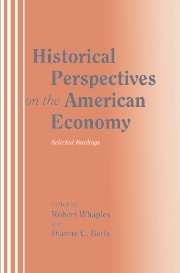Book contents
- Frontmatter
- Contents
- Acknowledgments
- Introduction to students
- Introduction to instructors
- Contributors
- I Introduction
- 1 “Does the past have useful economics?”
- II Colonial and early national economy
- III Slavery and servitude
- IV The South since the Civil War
- V The rise of American industrial might
- VI Populism
- VII Women in the economy
- VIII The Great Depression
- Appendix: Basics of regression
- Glossary
- Name index
- Subject index
1 - “Does the past have useful economics?”
Published online by Cambridge University Press: 05 June 2012
- Frontmatter
- Contents
- Acknowledgments
- Introduction to students
- Introduction to instructors
- Contributors
- I Introduction
- 1 “Does the past have useful economics?”
- II Colonial and early national economy
- III Slavery and servitude
- IV The South since the Civil War
- V The rise of American industrial might
- VI Populism
- VII Women in the economy
- VIII The Great Depression
- Appendix: Basics of regression
- Glossary
- Name index
- Subject index
Summary
It is not mere convention that impels me to thank the many colleagues who have commented on earlier drafts of this essay. I have received from them in writing the equivalent of over 100 typed pages, and many hours of conversation as well. This itself measures the vigor of historical economics, one theme here, but their contribution to the product is immeasurable. I would like to thank, therefore, the seminars in economic history at Chicago and at Northwestern; and R. Cameron, M. Edelstein, S. L. Engerman, R. W. Fogel, R. Gallman, H. Gemery, C. D. Goldin, G. Gunderson, G. Hawke, R. Higgs, G. Hueckel, J. R. T. Hughes, H. G.Johnson, E. L.Jones, A. Kahan, C. P. Kindleberger, A. Leijonhufvud, P. Lindert, P. McClelland, At. Mclnnis, J. Mokyr, L. D. Neal, A. Olmstead, D. Perkins, J. D. Reid, N. Rosenberg, W. W. Rostow, A.J. Schwartz, B. Solow, G. Walton, D. Whitehead, andj. G. Williamson. And I would like to apologize to George Stigler for inverting for my own purposes the title of his fine essay, “Does Economics Have a Useful Past?” {107, 1969}, and for ignoring the useful lemma illustrated there (p. 226): “there are not ten good reasons for anything.”
The answer, of course, is “yes,” and at one time the very question would have seemed impertinent. Smith, Marx, Mill, Marshall, Keynes, Heckscher, Schumpeter, and Viner, to name a few, were nourished by historical study and nourished it in turn.
- Type
- Chapter
- Information
- Historical Perspectives on the American EconomySelected Readings, pp. 3 - 38Publisher: Cambridge University PressPrint publication year: 1995
- 6
- Cited by



